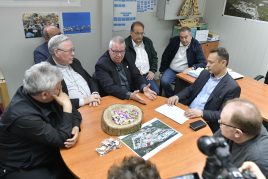
 The temptation for countries to close in on themselves and protect their own interests alone is high especially in times of crisis. “Solidarity” is key to winning this battle and emerging from the crisis. The bishops of the European Union reaffirmed this point in their plenary assembly. The meeting – held online from 17 to 18 March with the delegates of the Bishops’ Conferences of the European Union – kicked off with the contribution of European Commission Vice-President Margaritis Schinas. Over an hour-long conversation focused on COVID-19 pandemic recovery, migration and asylum policies, freedom of religion and of worship in the EU. “Vice-President Schinas demonstrated a willingness to consult with the bishops and not evade complex issues, emphasizing solidarity as the overriding principle”, Father Manuel Barrios Prieto, COMECE Secretary General, told SIR. “Solidarity in vaccine management and distribution; solidarity in tackling the migration issue; solidarity in addressing the socio-economic impact of the Coronavirus crisis. Commissioner Schinas also said that the dialogue between the Churches and the EU institutions should embrace the moral and ethical contribution of the Churches, as provided for in Article 17 of the Treaty on the Functioning of the European Union (TFEU), rather than being purely declaratory and generic.”
The temptation for countries to close in on themselves and protect their own interests alone is high especially in times of crisis. “Solidarity” is key to winning this battle and emerging from the crisis. The bishops of the European Union reaffirmed this point in their plenary assembly. The meeting – held online from 17 to 18 March with the delegates of the Bishops’ Conferences of the European Union – kicked off with the contribution of European Commission Vice-President Margaritis Schinas. Over an hour-long conversation focused on COVID-19 pandemic recovery, migration and asylum policies, freedom of religion and of worship in the EU. “Vice-President Schinas demonstrated a willingness to consult with the bishops and not evade complex issues, emphasizing solidarity as the overriding principle”, Father Manuel Barrios Prieto, COMECE Secretary General, told SIR. “Solidarity in vaccine management and distribution; solidarity in tackling the migration issue; solidarity in addressing the socio-economic impact of the Coronavirus crisis. Commissioner Schinas also said that the dialogue between the Churches and the EU institutions should embrace the moral and ethical contribution of the Churches, as provided for in Article 17 of the Treaty on the Functioning of the European Union (TFEU), rather than being purely declaratory and generic.”
EU Member States are striving to contain the epidemic. This battle has unfortunately come to a head in the last few hours with the uncertainty surrounding AstraZeneca’s vaccines and the suspension of vaccinations in several countries. Was this issue raised?
 The Commissioner illustrated the European vaccine strategy, the seriousness of the European proposal, the seriousness of controls. I do believe that given the present challenging situation, we must have confidence that everything is being properly done, that inspections are being carried out responsibly, and that the vaccines comply with all monitoring and production procedures. We are all concerned but we should not lose hope that things will get better soon. Had we had to face this crisis alone, each country on its own, surely the situation would be much worse.
The Commissioner illustrated the European vaccine strategy, the seriousness of the European proposal, the seriousness of controls. I do believe that given the present challenging situation, we must have confidence that everything is being properly done, that inspections are being carried out responsibly, and that the vaccines comply with all monitoring and production procedures. We are all concerned but we should not lose hope that things will get better soon. Had we had to face this crisis alone, each country on its own, surely the situation would be much worse.
The existence of Europe, of this area of solidarity and common understanding, is a safety net.
Vaccinations are entering a very delicate phase in European countries. Everyone hopes that this will soon bring us out of this crisis. What are your main concerns? Which mistakes should be avoided?
 In his opening address to the assembly, the COMECE president, Cardinal Hollerich gave a beautiful speech in which he also identified the risks Europe might have to face.
In his opening address to the assembly, the COMECE president, Cardinal Hollerich gave a beautiful speech in which he also identified the risks Europe might have to face.
Such risks include in particular the temptation to close in on oneself. The temptation for everyone to save themselves alone. This is the great challenge characterising periods of uncertainty and fear.
What is your opinion on the response of the European Union and the Member States?
We have the impression that the bitter lesson of COVID, namely that no one is saved alone, has not yet been fully understood. Self-centred attitudes persist and are a cause for concern, not least because in crisis situations people tend to protect and think of themselves first. With regard to the AstraZeneca episode, countries halted vaccination at different times and not with a general agreement across Europe. Solidarity and unity are the two guiding principles for exiting this crisis in the best and fastest way possible. This applies to vaccines as well as to economic recovery, to employment, to care for the most vulnerable.
Solidarity is therefore destined to become a key factor in the coming months.
The migration emergency has fallen into the background as a result of the COVID emergency situation. It is an item on agenda of the European bishops. What are your concerns and what are your requests?
 This past September the EU Commission presented the new Pact on Asylum and Migration, an eagerly awaited package of measures for the reform of European policies for overcoming also the so-called Dublin system. It is based on three main pillars: protecting borders; supporting countries of origin in their growth and development so as to prevent young people from seeking a decent future abroad; and introducing a solidarity mechanism whereby first-arrival countries such as Spain, Italy and Greece are not left alone to bear the burden of arrivals.
This past September the EU Commission presented the new Pact on Asylum and Migration, an eagerly awaited package of measures for the reform of European policies for overcoming also the so-called Dublin system. It is based on three main pillars: protecting borders; supporting countries of origin in their growth and development so as to prevent young people from seeking a decent future abroad; and introducing a solidarity mechanism whereby first-arrival countries such as Spain, Italy and Greece are not left alone to bear the burden of arrivals.
“Freedom of religion” will also be discussed in the Assembly meeting. What are you referring to?
 It concerns a situation that we have all experienced during the lockdown period when religious services in public places were not allowed due to anti-COVID measures taken in various countries, sometimes without proper dialogue with the Church. In other words, we had the impression that the right to religious freedom and the exercise of this freedom were being undermined. However, a deeper analysis of the issue shows that religious life in Europe is being sidelined, forgotten and in some cases even despised compared to other rights. The bishops therefore consider it necessary to emphasise that religion is not something belonging to the past, but a living presence today that contributes to the common good of our societies. Certain issues have caused great concern among the bishops, such as Denmark’s legislative proposal on translating homilies and sermons into Danish. This regulation is perhaps intended for Islamic communities, but asking our priests or religious ministers to translate their homilies is an overt interference in religious freedom. If Europe were to lose sight of the significance of religious life, it would be renouncing an important part of its history and the lifeblood that runs through it and enriches it to this day.
It concerns a situation that we have all experienced during the lockdown period when religious services in public places were not allowed due to anti-COVID measures taken in various countries, sometimes without proper dialogue with the Church. In other words, we had the impression that the right to religious freedom and the exercise of this freedom were being undermined. However, a deeper analysis of the issue shows that religious life in Europe is being sidelined, forgotten and in some cases even despised compared to other rights. The bishops therefore consider it necessary to emphasise that religion is not something belonging to the past, but a living presence today that contributes to the common good of our societies. Certain issues have caused great concern among the bishops, such as Denmark’s legislative proposal on translating homilies and sermons into Danish. This regulation is perhaps intended for Islamic communities, but asking our priests or religious ministers to translate their homilies is an overt interference in religious freedom. If Europe were to lose sight of the significance of religious life, it would be renouncing an important part of its history and the lifeblood that runs through it and enriches it to this day.









